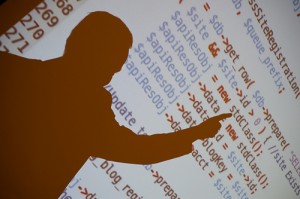 Part One of Series:
Part One of Series:
The Future of Programming (for Non-Programmers)
Today we are witnessing the rise of the Programmer as one of the most important enabling actors in the global knowledge economy.
These individuals and communities who design and build software that power computing devices and networks that permeate our world might occupy ‘the’ drivers seat of change in the 21st century. And yet – who they are – what they do – and how they do it remains a mystery to most people in the world.
Programmers have been behind many of the enabling ‘new economy’ dynamics of the early 21st century: bootstrapped startup culture, open source, social media and networks, platforms and networked-based business models, hacking and mash-ups, remote working and collaboration, real-time, data visualization, high frequency ‘algo’ trading, and radical transparency.
Most of these things emerged out of left-brained geek culture led by early adopter programmer communities.
Whether you embrace a ‘market-oriented‘, ‘techno-optimist‘ or ‘sustainable economy‘ worldview, it seems impossible to envision a 21st century of transformational social, economic and environmental change without a central Role of the Programmer. We cannot expand capital markets, democratize access to information (or radical transparency), or scale an advanced cleantech world without software driving the entire process.
Programmers as Systems Designers
Looking beyond 2010 – programming has less to do with ‘web connected desktop computers’ and more to do with software reshaping every aspect of human society from financial trading markets to laboratory research, to monitoring natural ecosystems or our own self-direct learning.
Programmers are already moving forward to emerging industries -‘smart’ infrastructure (energy/transportation), nanoscale materials design, robotics, education/learning systems, security/military, and all the so-called ‘2.0’ versions of government, healthcare, agriculture and food.
Software is the virtual lubricant for this yet to be built global system of systems – and we get nowhere without understanding (and embracing) the Programmer as a key enabling actor on the world stage.
The Left-Brained Future: Foundations of our Knowledge Economy
We are familiar with the popular professions associated with the supposed right brain Knowledge Economy – it is designers, entrepreneurs, and other ‘creatives’ who are celebrated.
Yet, that we can even indulge in more creative right brain economic activities, is only the result of typically left brained programmers automating the world and reducing the demand for human attention to the routine tasks.
The creative class workforce would not exist without the software-hardware infrastructure coded by geek class programmers. Nor would many of our most celebrated companies and industries.
When Apple, Google, Facebook, or Twitter succeed it is because they have cultivated strong relationships with programmers (e.g. developers) who drive their platforms forward.
When an entrepreneur enters the market with a new concept, it is likely that the barriers to entry were knocked down by programmers who disrupted in the incumbent marketplace with new tools.
When a Wall Street company sees profits it is largely because programmers were involved in designing the analytic and analysis tools to shape investment strategies – or via high frequency trading ‘algos’ that dominate trading exchanges.
When a Biotechnology or Cleantech company announces a breakthrough product- it was likely built via simulation software tools designed by programmers.
We might not understand how it works, but software will likely shape the majority of social and economic activities in the 21st century. Our future will be programmed.
A Place in History?
My belief is that the Programmer will earn a spot in history – as relevant to social change as past archetype roles.
Every major era of massive social-economic change has seen new archetypes emerge as the symbols of transformation. The Agricultural-Town era had the farmer and craftsman, the Industrial Age had the factory owner and worker. Our information-rich and business oriented world is often embodied by the archetypes of CEO, banker, entrepreneur and the consumer.
But at the center of most all modern economic activity is the Programmer – those individuals and communities who design and build software that power computing devices and networks that will soon permeate most aspects of the planet.
Next up
This Series is designed to highlight how Programmers might transform our society, economies and environment. And to explore ways in which humanity might tap its inner geek to bring about more transformative change capable of breaking beyond today’s performance limits.
- Part One: Why the Future will be Programmed
- Part Two: Programmers as 21st Century Learners
- Part Three: Programmers – From Social Web to Wisdom Web
- Part Four: Programmers and World of Finance & Capital Markets
- Part Five: Programmers – Governance, Power & Radical Transparency
- Part Six: Programmers – Smart Infrastructure & Situational Awareness
- Part Seven: Programmers – Science and Simulation
- Part Eight: The Rise of the Female Programmer
- Part Nine: Programmers – Future of Work
Image (Thanks!):

{ 1 comment… read it below or add one }
GARRY,
i heard you talk at the KENNEDY CENTER’s art in education annual meeting last February.
i enjoyed you talk immensely.
as an architect, i was most excited about the issue of THE THIRD PLACE.
can you direct me to either a video or an article where you expand on this topic? i brought it up with some of my graduate students and it has provoked a lot of interest.
thanks,
hector